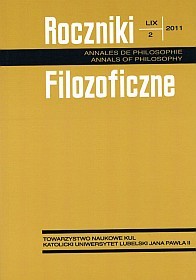Aksjologiczny wymiar pracy i odpoczynku w perspektywie ewolucyjnej
Abstrakt
It seems that work and rest are two fundamentally different ways of human functioning. When acting we believe we are needed and we can find meaning of live. Rest is rather referred to a passive attitude, when man doesn’t perform any operations but regenerates his physical or spiritual forces. These seemingly independent phenomena, however, can be regarded as two “sides of the same coin”. Christian teaching stresses that both of them represent the ways for human development and growth of the relation with God. By analogy, I want to show that in the context of reflection on human work it’s worth to present complementary cognitive perspectives. Contemporary knowledge about our evolutionary ancestors reveals the picture of hominids who acquired basic livelihoods by physical work. Nevertheless, individual efforts became gradually involved in social group’s existence. Moreover, human will to survive had been completed with the search of non-pragmatic aims of engagement when work generated basic questions concerning the meaning and value of human cooperation. Integral anthropological thought, therefore, demands not only analysis from the natural sciences point of view but also humanistic reflections on the unique status of man who creates culture and puts deep metaphysical questions.
Bibliografia
Binford L.R.: Faunal Remains from Klasies River Mouth, New York: Academic Press 1984.
Kunicki-Goldfinger W.J.H.: Znikąd donikąd, Warszawa: PIW 1993.
Simons E.L.: Human origins, „Science” 245:1989, s. 1343-1350.
Słomka M.: Ewolucjonizm chrześcijański o pochodzeniu człowieka, Lublin: Gaudium 2004.
Wojtyła K.: Osoba: podmiot i wspólnota, [w:] Osoba i czyn oraz inne studia antropologiczne, red. W. Chudy [i in.], Lublin: TN KUL 1994.
Wojtyła K.: Transcendencja osoby w czynie a autoteleologia człowieka, [w:] Osoba i czyn oraz inne studia antropologiczne, red. W. Chudy [i in.], Lublin: TN KUL 1994, s. 485-486.
Wong K.: Zagadkowi neandertalczycy, „Świat Nauki” 13 (2003), nr 3 (wyd. specjalne), s. 28-37.
Copyright (c) 2011 Roczniki Filozoficzne

Utwór dostępny jest na licencji Creative Commons Uznanie autorstwa – Użycie niekomercyjne – Bez utworów zależnych 4.0 Międzynarodowe.





